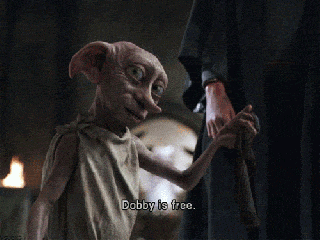
At first glance, the Harry Potter series seems like a bit of fun, an interesting and diverting read, but with no serious meaning. Upon closer inspection however, it carries several weighty philosophical truisms and beliefs.
As with the classic film The Matrix, there are obvious Christian parallels. The main character has to die to save the world, Harry must be killed by those who are taken over by evil and who have blinded or obscured their moral compass; but ultimately the goodness and love shown by the hero triumphs and evil is banished. The majority of readers are aware of this connection, but there are more philosophical connections than just that one theme.
Death is the most interesting example of Rowling’s philosophy being transmitted in her work; she herself said that she wanted to “attempt to make some sense of death” in the books. At the climax of his moral growth, Harry is unafraid of death, he willingly goes to Voldemort to save his friends. Dumbledore has come to realise that “death is but the next great adventure”, a sharp juxtaposition to the way Voldemort treats death. Unlike Dumbledore’s casual acceptance and embracing of death, he is so terrified of death that he is willing to kill others to attempt to prolong his time until death, and is willing to live a half-life, a shadow of that of the normal human. Rowling also shows the reader that there is life after death, for better-as Harry’s dead family and friends have been watching over him-or worse-as Voldemort’s whimpering body in the ‘death’ scene shows.
Rowling also shows the morals she feels should be followed. The most obvious example is how Harry survives due to the love shown to him by his mother, and how he and his friends work together with ‘fair play’ to beat Voldemort. But there are also less obvious examples of ‘moral fibre’, there is Neville who stands up to his friends and at the climatic final scene is the only one who resists Voldemort. Ginny too, never gives up on her desires and is eventually rewarded, Dobby does all he can to help his friends whilst being loyal and loving. And Voldemort’s cynical, callous, psychopathic manipulation or those around him is clearly a warning against those traits.
The way in which Rowling embeds suggestions on how to live life and on philosophical questions is of great interest, and there are far more examples of it than listed here. In Rowling’s series, one can read a deeper symbolic meaning, and with it comes a whole host of philosophical queries and rationales.

in ref to the title quote: i want to be riding something that’ll leave the finder, “WTF?”
LikeLike
I’m afraid I don’t quite follow.
Best, Matt
LikeLiked by 1 person
the P.J. quote…
LikeLike
I am always so impressed by your ability to analyze a book. I am DRIVEN to ask this question. Do you ever read one and NOT analyze as you’re reading it? I ask because I read “How To Read Literature Like A Professor” and it NEARLY put me off reading altogether.
LikeLiked by 1 person
I can’t claim any credit for this idea I’m afraid, the resurrection thing is fairly common and the idea of death within the book was mentioned in passing to me recently, so I just had a think and a look at the book.
One of my English teachers at school analyses poems in a brilliant way, and always shows things that we miss; but I think the key thing is practice and reading slowly whilst thinking about alternative spellings, irony, and so on (though I’m not really sure I’m afraid!).
Best wishes, Matt
LikeLiked by 1 person
I’ll never read them the same again Matt.
That’s a good thing though I’ll be reading more into them in future☺
LikeLiked by 1 person
Beautiful
LikeLiked by 1 person